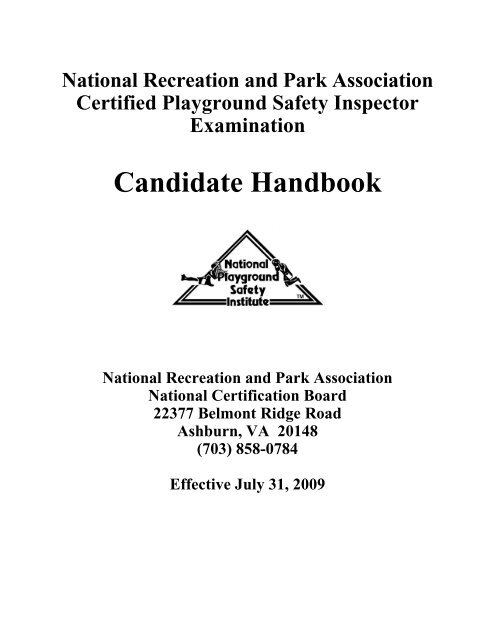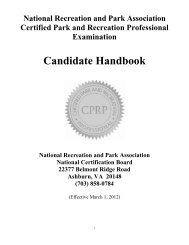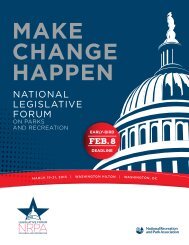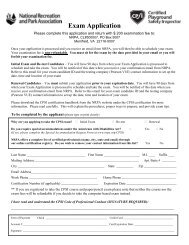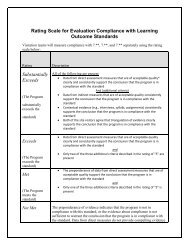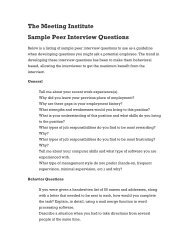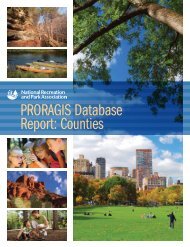CPSI Candidate Handbook - National Recreation and Park ...
CPSI Candidate Handbook - National Recreation and Park ...
CPSI Candidate Handbook - National Recreation and Park ...
Create successful ePaper yourself
Turn your PDF publications into a flip-book with our unique Google optimized e-Paper software.
<strong>National</strong> <strong>Recreation</strong> <strong>and</strong> <strong>Park</strong> Association<br />
Certified Playground Safety Inspector<br />
Examination<br />
<strong>C<strong>and</strong>idate</strong> <strong>H<strong>and</strong>book</strong><br />
<strong>National</strong> <strong>Recreation</strong> <strong>and</strong> <strong>Park</strong> Association<br />
<strong>National</strong> Certification Board<br />
22377 Belmont Ridge Road<br />
Ashburn, VA 20148<br />
(703) 858-0784<br />
Effective July 31, 2009
TABLE OF CONTENTS<br />
INTRODUCTION 3<br />
Examination Development 3<br />
About the Testing Agency 3<br />
SECTION I: ADMINISTRATIVE POLICIES AND RULES FOR EXAMINATION<br />
Admission <strong>and</strong> Testing 4<br />
Services for Individuals with Disabilities 4<br />
Inclement Weather or Emergency 4<br />
Exam Preparation 5-6<br />
Copyrighted Examination Questions 6<br />
Release of Information 6<br />
Following the Examination <strong>and</strong> Scoring Results 6<br />
Duplicate Score Reports 6<br />
Duplicate Certificates 7<br />
Scores Cancelled by NCB 7<br />
Appeals 7<br />
Your Status as a Certified Playground Safety Inspector 7<br />
Statement of Non-Discrimination 7<br />
SECTION II: STUDY GUIDE<br />
General Examination Preparation 8<br />
Study Advice 8<br />
Test-taking Advice 8<br />
Re-examination 8<br />
Exam Content Outline 9-10<br />
Exam Question Material Basis 11<br />
SECTION III: <strong>CPSI</strong> CODE OF PROFESSIONAL CONDUCT 12<br />
Copyright 2009. <strong>National</strong> <strong>Recreation</strong> <strong>and</strong> <strong>Park</strong> Association.<br />
All rights reserved. No part of this publication may be reproduced or transmitted in any form or by any means, electronic<br />
or mechanical, including photocopy or recording, or any information <strong>and</strong> retrieval system, without permission in writing<br />
from the <strong>National</strong> <strong>Recreation</strong> <strong>and</strong> <strong>Park</strong> Association.<br />
2
INTRODUCTION<br />
This examination is one of the principal requirements for certification as a "Certified Playground Safety Inspector"<br />
(<strong>CPSI</strong>). The examination is administered under the auspices of the <strong>National</strong> <strong>Recreation</strong> <strong>and</strong> <strong>Park</strong> Association (NRPA),<br />
the <strong>National</strong> Playground Safety Institute (NPSI) <strong>and</strong> the <strong>National</strong> Certification Board (hereafter referred to as NCB).<br />
About the Certified Playground Safety Inspector Examination<br />
The purpose of the <strong>CPSI</strong> Exam is to enable those who successfully complete the course to:<br />
o Identify hazards on public playground equipment <strong>and</strong> the playground<br />
o Rank the hazards according to injury potential<br />
o Apply the knowledge to remove the hazards <strong>and</strong> establish a system of inspections<br />
The desired outcome is that a Certified Playground Safety Inspector (<strong>CPSI</strong>) is capable of establishing the basics of a sound<br />
risk reduction program, is able to audit a playground, establish a system of repair, retrofit <strong>and</strong> removal of hazardous<br />
equipment <strong>and</strong> establish a routine inspection system for their own agency or playground owner-client.<br />
Examination Development<br />
NRPA underst<strong>and</strong>s that achieving the <strong>CPSI</strong> certification does not make one an expert in the implementation of the<br />
public use playground st<strong>and</strong>ard of care. However, NRPA does recognize all program participants should acquire the<br />
knowledge <strong>and</strong> specific competencies necessary to attain certification as identified by the <strong>CPSI</strong> Certification <strong>and</strong><br />
Exam Committees. This knowledge properly <strong>and</strong> consistently applied in the field will help to create an experience<br />
level necessary to be considered a playground safety expert.<br />
All examination items (questions) have been written <strong>and</strong> reviewed by subject-matter experts representing playground<br />
safety experts <strong>and</strong> practitioners from many geographical regions. These individuals provide the job-related perspective<br />
<strong>and</strong> expertise that underlies valid examinations.<br />
About the Testing Agency<br />
NRPA <strong>and</strong> the NCB have the overall responsibility for the examination <strong>and</strong> have contracted with a professional testing<br />
agency to administer <strong>and</strong> provide guidance.<br />
Applied Measurement Professionals, Inc. (AMP) is the professional testing agency contracted by NRPA <strong>and</strong> assists in<br />
the development of the computerized examination based on the test specifications developed by the <strong>CPSI</strong> Certification<br />
<strong>and</strong> Exam Committee in consultation with the testing agency. The testing agency is responsible for the establishment of<br />
test centers, security, administration, scoring <strong>and</strong> analysis of the examinations <strong>and</strong> reporting scores to c<strong>and</strong>idates who<br />
take the examination under the direction of the NRPA.<br />
3
SECTION I: ADMINISTRATIVE POLICIES AND RULES FOR EXAMINATION<br />
Individuals seeking certification as a <strong>CPSI</strong> must receive a passing grade on the <strong>CPSI</strong> certification examination.<br />
Maintenance of the <strong>CPSI</strong> certification requires at least a passing grade on the <strong>CPSI</strong> certification examination every three<br />
(3) years.<br />
Examination Fee $200<br />
You must schedule a test date by the date on the postcard or you will forfeit your payment.<br />
No-shows/ Failing the examination - <strong>C<strong>and</strong>idate</strong>s who fail to appear for an examination or fail the examination, are not<br />
entitled to a refund, nor will the fees be applied to the next exam administration. The <strong>C<strong>and</strong>idate</strong> will need to fill out a<br />
new application <strong>and</strong> reapply to sit for the exam.<br />
Cancellations – A c<strong>and</strong>idate who cancels his/her examination after confirmation of eligibility is received forfeits the<br />
application <strong>and</strong> all fees paid to take the examination. The <strong>C<strong>and</strong>idate</strong> will need to fill out a new application <strong>and</strong><br />
reapply to sit for the exam.<br />
AMP will send eligible c<strong>and</strong>idates a card with a toll free number <strong>and</strong> website. Please call this number (800)345-6559 or<br />
access the website (www.goamp.com) to find a location or set up time <strong>and</strong> day for testing. Under <strong>C<strong>and</strong>idate</strong>s, select<br />
other as the category, <strong>National</strong> <strong>Recreation</strong> <strong>and</strong> <strong>Park</strong> Association <strong>and</strong> then select NRPA Certified Playground Safety<br />
Inspector.<br />
When you call to schedule an appointment for the examination, you will be notified of the time to report to the center.<br />
Please make a note of this because you will NOT receive an admission ticket. UNSCHEDULED CANDIDATES<br />
(WALK-INS) WILL NOT BE ADMITTED to the assessment center.<br />
A c<strong>and</strong>idate may reschedule ONE appointment for examination at no charge by calling AMP at least four<br />
business days prior to the scheduled testing session.<br />
Services for Individuals with Disabilities<br />
The NRPA, NCB <strong>and</strong> AMP comply with the Americans with Disabilities Act <strong>and</strong> strive to ensure that no individual<br />
with a disability is deprived of the opportunity to take the examination solely by reason of that disability. The c<strong>and</strong>idate<br />
will be provided reasonable accommodations for c<strong>and</strong>idates with disabilities.<br />
A c<strong>and</strong>idate who has a disability may request special accommodations; the request must be submitted in writing at the<br />
time of application. The request form is available online at www.nrpa.org. A written description of the disability <strong>and</strong><br />
verification from a licensed physician should be included with the application. You must also inform AMP of your need<br />
for special accommodations when scheduling your examination time.<br />
Inclement Weather or Emergency<br />
In the event of inclement weather or unforeseen emergencies on the day of an examination, AMP will determine<br />
whether circumstances warrant the cancellation, <strong>and</strong> subsequent rescheduling of an examination. The examination<br />
will usually not be rescheduled if the assessment center personnel are able to open the assessment center. If power<br />
to an Assessment Center is temporarily interrupted during an administration, your examination will restart where<br />
you left off <strong>and</strong> you may continue the examination.<br />
<strong>C<strong>and</strong>idate</strong>s may visit AMP’s website at www.goAMP.com prior to the examination to determine if AMP has been<br />
advised that any assessment centers are closed. Every attempt is made to administer examinations as scheduled;<br />
however, should an examination be canceled at an assessment center, all scheduled c<strong>and</strong>idates will receive<br />
notification following the examination regarding a rescheduled examination date or reapplication procedures.<br />
4
Please read the following information carefully so that you are fully prepared on the Examination Day<br />
• Report to the assessment center no later than your scheduled testing time. Once you enter the office, look for<br />
the sign indicating “AMP Assessment Center Check-In”. A CANDIDATE WHO ARRIVES MORE THAN<br />
15 MINUTES AFTER THE SCHEDULED TESTING TIME WILL NOT BE ADMITTED<br />
• To gain admission to the assessment center, a c<strong>and</strong>idate needs to present two forms of identification, one with a<br />
current photograph. Both forms of identification must be current <strong>and</strong> include the c<strong>and</strong>idate’s current name <strong>and</strong><br />
signature. The c<strong>and</strong>idate will also be required to sign a roster for verification of identity.<br />
Acceptable forms of photo identification include: a current driver’s license with photograph, a current state<br />
identification card with photograph, a current passport, or a current military identification card with photograph.<br />
Employment ID cards, student ID cards, <strong>and</strong> any types of temporary identification are not acceptable.<br />
YOU MUST HAVE PROPER IDENTIFICATION TO GAIN ADMISSION TO THE ASSESSMENT CENTER.<br />
FAILURE TO PROVIDE APPROPRIATE IDENTIFICATION AT THE TIME OF THE EXAMINATION IS<br />
CONSIDERED A MISSED APPOINTMENT. THERE WILL BE NO REFUND OF YOUR EXAM FEE.<br />
• The NRPA <strong>and</strong> AMP maintain examination administration <strong>and</strong> security st<strong>and</strong>ards that are designed to assure that all<br />
c<strong>and</strong>idates are provided the same opportunity to demonstrate their abilities. The assessment center is continuously<br />
monitored by audio <strong>and</strong> video surveillance equipment for security purposes.<br />
• Examinations are proprietary. No cameras, notes, tape recorders, personal digital assistants (PDAs), pagers or<br />
cellular phones are allowed in the testing room. Use of cellular phone or other electronic devices is strictly prohibited<br />
<strong>and</strong> will result in dismissal from the examination.<br />
• No calculators are permitted<br />
• No guests, visitors or family members are allowed in the testing room or reception areas.<br />
• No personal items, valuables, or weapons should be brought to the Assessment Center. Only keys <strong>and</strong> wallets may<br />
be taken into the testing room <strong>and</strong> AMP is not responsible for items left in the reception area.<br />
• You will be provided with scratch paper <strong>and</strong> a pencil to use during the examination, which must be returned to the<br />
supervisor at the completion of testing, or you will not receive a score report. No documents or notes of any kind<br />
may be removed from the examination room.<br />
• No questions concerning the content of the examination may be asked during the examination.<br />
• Eating, drinking, or smoking will not be permitted in the Assessment Center. You may take a break whenever you<br />
wish, but you will not be allowed additional time to make up for time lost during breaks.<br />
• After your identification has been confirmed, you will be directed to a testing carrel. You will capture your own<br />
photograph <strong>and</strong> it will remain on-screen throughout your testing session. This photograph will also print on your<br />
score report.<br />
• Prior to attempting the examination, you will be given the opportunity to practice taking a test on computer. The<br />
time you use for this practice test is NOT counted as part of your examination time. When you are comfortable with<br />
the computer testing process, you may stop the practice session <strong>and</strong> begin the time examination.<br />
• Following the practice examination, you will begin the actual examination. Instructions for taking the examination<br />
are provided on-screen. Two hours are allotted to complete the examination.<br />
• The computer monitors the time you spend on the examination. The examination will terminate if you exceed two<br />
hours. You may click on the “Time” box in the lower right-h<strong>and</strong> corner of the screen or select the TIME key to<br />
monitor your time. A digital clock indicates the time remaining for you to complete the examination. The time<br />
feature may also be turned off during the examination.<br />
• Only one examination question is presented at a time. The question number appears in the lower right h<strong>and</strong> corner<br />
of the screen. Choices of answers to the examination question are identified as A, B, C, or D. Indicate your choice<br />
by either entering the letter of the option you think is correct (A, B, C, or D) or clicking on the option using<br />
the mouse. To change your answer, enter a different option by pressing the A, B, C or D Key or by clicking on the<br />
option using the mouse. You may change your answers as many times as you wish.<br />
• To move to the next item, click on the forward arrow (>) in the lower right-h<strong>and</strong> corner of the screen or select the<br />
NEXT key. This action will move you forward through the examination item by item. If you wish to review any<br />
item, click the backward arrow (
• An examination question may be left unanswered for return later in the examination session. Questions may also be<br />
bookmarked for later review by clicking in the blank square to the right of the time button. Clicking on the h<strong>and</strong> icon<br />
or selecting the NEXT key advances to the next unanswered question on the examination. To identify all<br />
unanswered items, repeatedly click on the h<strong>and</strong> icon or press the NEXT key. When you have completed the<br />
examination, the number of questions you answered is reported. If you have not answered all items <strong>and</strong> you have<br />
time remaining, return to the examination <strong>and</strong> answer those items. Be sure to answer each test item before ending the<br />
examination. There is no penalty for guessing<br />
• Comments: During the examination, online comments may be provided for any question by clicking on the button<br />
displaying an exclamation point (!) to the left of the time button. This opens a dialogue box where comments may be<br />
entered. Comments will be reviewed, but individual responses to question comments will not be provided.<br />
• Individuals who engage in any of the following conduct may be dismissed from the examination, their scores will not<br />
be reported <strong>and</strong> examination fees will not be refunded. Examples of misconduct are when a c<strong>and</strong>idate:<br />
1. creates a disturbance, is abusive, or otherwise uncooperative;<br />
2. displays <strong>and</strong>/or uses electronic communications equipment such as pagers, cellular phones, PDAs:<br />
3. gives or receives help or is suspected of doing so;<br />
4. attempts to record examination questions or make notes;<br />
5. attempts to take the examination for someone else; or<br />
6. is observed with notes, books or other aids<br />
Copyrighted Examination Questions<br />
All examination questions are copyrighted property of The NRPA. It is forbidden under federal copyright law to copy,<br />
reproduce, record, distribute or display these examination questions by any means, in whole or in part. Doing so may<br />
subject you to severe civil <strong>and</strong> criminal penalties.<br />
Release of Information<br />
NRPA, NCB, <strong>and</strong> the testing agency are all committed to protecting the confidentiality of c<strong>and</strong>idates' records <strong>and</strong> have<br />
adopted policies to ensure their privacy. Information about c<strong>and</strong>idates for credentialing <strong>and</strong> their examination results are<br />
not routinely released to any third party. Notification of pass/fail goes solely to NRPA.<br />
Following the Examination <strong>and</strong> Scoring of Results<br />
After you finish the examination, you are asked to complete a short evaluation of your testing experience. Then, you are<br />
instructed to report to the examination proctor to receive your score report. At this time you will receive a score report.<br />
Scores are reported in written form only, in person, or by US Mail. Scores are not reported over the telephone, by<br />
electronic mail or by facsimile.<br />
The passing score for the examination reflects the amount of knowledge that a committee of experts has determined to<br />
be appropriate for certification. A criterion-referenced st<strong>and</strong>ard setting procedure <strong>and</strong> expert judgment was used to<br />
evaluate each item on the examination in order to identify the passing point. Your ability to pass the examination<br />
depends on the amount of knowledge you display, <strong>and</strong> not on the other individuals taking the test. Although different<br />
forms of the examination can vary somewhat in difficulty, passing the examination has historically required c<strong>and</strong>idates<br />
to answer approximately 70-73 percent of the questions correctly.<br />
Subsection scores are reported as raw scores. The sum of your subsection scores equals the number of items you<br />
answered correctly on the entire examination. The reason for reporting subsection scores is to enable you to evaluate<br />
your performance on each part of the test.<br />
Duplicate Score Reports<br />
<strong>C<strong>and</strong>idate</strong>s may purchase additional copies of their score reports at a cost of $25 per copy. Requests must be<br />
submitted to AMP in writing within 12 months after the examination. The request must include the c<strong>and</strong>idate’s<br />
name, address, telephone number, date of examination, <strong>and</strong> examination taken. Submit this information with the<br />
required fee payable to AMP. Duplicate score reports will be mailed within approximately two weeks after receipt<br />
of the request.<br />
6
Duplicate Certificate Request<br />
<strong>C<strong>and</strong>idate</strong>s may purchase additional copies of their certificate at a cost of $10 per copy. Requests for the duplicate<br />
certificate form can be emailed to certification@nrpa.org with your name, address, telephone number, <strong>and</strong> date of<br />
examination. Duplicate certificates will be mailed within approximately two weeks after receipt of the request.<br />
Scores Cancelled<br />
NRPA's testing agency is obligated to report scores that accurately reflect the performance of each c<strong>and</strong>idate. For this<br />
reason, the testing agency maintains test administration <strong>and</strong> test security st<strong>and</strong>ards that are designed to assure that all<br />
c<strong>and</strong>idates are provided the same opportunity to demonstrate their abilities <strong>and</strong> to prevent some c<strong>and</strong>idates from gaining<br />
an unfair advantage over others due to testing irregularities or misconduct. The testing agency will routinely review<br />
irregularities <strong>and</strong> test scores suspected of unusual or non-st<strong>and</strong>ard circumstances <strong>and</strong> report such to NRPA.<br />
NRPA reserves the right to withhold or cancel test scores if, in its sole opinion, there is reason to question their validity.<br />
Scores considered for cancellation by NRPA may be grouped into two categories:<br />
1. Suspected c<strong>and</strong>idate misconduct. In such cases, NRPA may initially withhold test scores <strong>and</strong> notify the<br />
c<strong>and</strong>idates that they have the opportunity to provide additional information as requested by NRPA. NRPA may<br />
also undertake a confidential review if the circumstances giving rise to the questionable score validity. If it is<br />
determined that there is sufficient cause to question score validity, NRPA may cancel the score(s) <strong>and</strong> inform<br />
the involved parties.<br />
2. Irregularities. Scores may be withheld <strong>and</strong>/or cancelled because of circumstances beyond c<strong>and</strong>idate’s control,<br />
such as defective test materials or mistiming. In such cases, c<strong>and</strong>idates will be informed <strong>and</strong> offered an<br />
opportunity to retake the examination if NRPA determines that scores must be cancelled.<br />
In addition to the reasons listed above, NRPA may withhold or cancel examination results if, upon investigation,<br />
violation of NRPA policies outlined in this publication has been committed.<br />
Appeals<br />
Applicants desiring to appeal their examination score may write a letter of appeal to the NCB. In the letter,<br />
c<strong>and</strong>idates should state reasons why they do not agree with the examination outcome. Written appeals must be<br />
received within sixty (60) days of the examination date for the appeal to be considered. Send to NCB, c/o <strong>National</strong><br />
<strong>Recreation</strong> <strong>and</strong> <strong>Park</strong> Association, 22377 Belmont Ridge Road, Ashburn, VA 20148.<br />
Your Status as a Certified Playground Safety Inspector<br />
If you pass the <strong>CPSI</strong> Examination you will be awarded the <strong>CPSI</strong> designation as a Certified Playground Safety Inspector.<br />
NRPA will issue a <strong>National</strong> Certified Playground Safety Inspector certificate to each individual who passes the<br />
examination approximately eight (8) weeks after the results are released.<br />
Your certification is valid for three (3) years. No additional examinations will be required during that time. NRPA will<br />
provide information about maintenance of certification with your certificate. To facilitate communications, Certified<br />
Playground Safety Inspectors are required to advise NRPA of address, phone <strong>and</strong> email changes.<br />
Statement of Non-Discrimination<br />
The NRPA, NCB <strong>and</strong> AMP do not discriminate among applicants on the basis of age, gender, race, religion, national<br />
origin, disability, or marital status.<br />
7
SECTION II: STUDY GUIDE<br />
General Examination Preparation<br />
The study <strong>and</strong> test-taking advice described here may be helpful as you prepare for the examination. Try to be objective<br />
about yourself <strong>and</strong> your individual learning needs when you are deciding how best to proceed with your study.<br />
A. Study Advice<br />
Determine how you study best. Some students seem to learn faster by hearing the information, while others need to see it<br />
written or illustrated, <strong>and</strong> still others prefer to discuss material with colleagues. A combination of these alternatives can<br />
often produce the most effective study pattern. If you had success in lecture courses with little outside review, it may be<br />
that you need to hear information for best retention. If you find that you prefer to read material, then you might consider<br />
jotting down important facts on a 3x5 card. You can refresh your memory by periodically reviewing these cards. This<br />
technique is especially effective if you write the material thoughtfully <strong>and</strong> concisely, allowing you to digest the material<br />
through both reading <strong>and</strong> writing. You may wish to organize a study group or find a study partner. Once you decide on<br />
the method most effective <strong>and</strong> comfortable for you, focus on that preference <strong>and</strong> use the other techniques to complement<br />
it.<br />
Plan your study schedule well in advance. Use learning techniques, such as reading or audio-visual aids. Be sure you<br />
find a quiet place to study where you will not be interrupted.<br />
B. Test-Taking Advice<br />
The advice offered here is presented primarily to familiarize you with the test directions.<br />
1. Read all instructions carefully.<br />
2. The actual examination will be timed. Although the time remaining during the test can be shown on<br />
the computer screen, you may want to bring a watch to the test center.<br />
3. For best results pace yourself by periodically checking your progress. This will allow you to make<br />
any necessary adjustments. Remember, the more questions you answer, the better your chances of<br />
achieving a passing score.<br />
4. Be sure to record an answer for each question, even those of which you are uncertain. You can leave<br />
questions blank <strong>and</strong> come back. Avoid leaving any questions unanswered; this will maximize your<br />
chances of passing. It is better to guess than to leave a question unanswered; there is no penalty for<br />
guessing.<br />
Re-Examination<br />
<strong>C<strong>and</strong>idate</strong>s who fail the examination or who do not appear for a scheduled examination may be admitted to a future<br />
examination, provided they complete all current registration procedures <strong>and</strong> pay applicable fees.<br />
8
Exam Content Outline<br />
This outline illustrates the course content area <strong>and</strong> the percentage of questions on the certification exam that are<br />
based on each content area. You need to review this outline in preparation to take the exam.<br />
Content Area<br />
# of Items<br />
I. The Playground Safety Milieu 5<br />
A. The historical evolution of the Playground Safety Movement<br />
B. U.S. organizations <strong>and</strong> governmental agencies involvement<br />
II. Role of Child Development 5<br />
A. Characteristics of users<br />
1. anthropometrics<br />
2. disabilities<br />
B. Range of users-age appropriateness<br />
III. The Foundation of Playground Safety Surfacing 16<br />
A. Impact attenuation criteria-critical height<br />
B. Use zones-dimensions <strong>and</strong> overlap<br />
C. Surface testing: what, how, who<br />
D. Unitary surface products<br />
E. Loose-fill surfacing materials<br />
F. Accessibility-approach<br />
IV. The Playground Infrastructure: The Equipment 32<br />
A. Fall height<br />
B. Performance requirements<br />
1. head <strong>and</strong> neck entrapment<br />
2. sharp points <strong>and</strong> sharp edges<br />
3. protrusions<br />
4. entanglement<br />
5. pinch, crush <strong>and</strong> shear points<br />
6. suspended hazards<br />
C. Guardrails & Protective Barriers<br />
D. Structural characteristics<br />
E. Installation<br />
F. Specific types of playground equipment<br />
1. balance beams<br />
2. climbers<br />
3. upper body equipment<br />
4. sliding poles<br />
5. slides<br />
6. swings<br />
7. equipment not recommended<br />
8. moving, rotating, or rocking components<br />
9. roller slides<br />
10. seesaws<br />
11. spring rocking equipment<br />
12. log rolls<br />
13. track rides<br />
14. roofs<br />
15. climbing ropes<br />
9
G. Materials <strong>and</strong> manufacture<br />
1. structural designation<br />
2. metal <strong>and</strong> wood treatment<br />
3. plastics <strong>and</strong> other materials<br />
H. Access <strong>and</strong> egress<br />
1. rung <strong>and</strong> stepladders<br />
2. stairways<br />
3. ramps (other than wheelchair-accessible)<br />
4. other<br />
I. Equipment not covered by the CPSC or the ASTM<br />
J. Accessibility-use of equipment<br />
K. Platforms<br />
V. The Playground Layout <strong>and</strong> Design 15<br />
A. Equipment Placement<br />
B. Age separation<br />
C. Specific equipment relationships<br />
D. Orientation <strong>and</strong> other environmental factors<br />
E. Master planning<br />
F. Labeling<br />
G. Accessibility-route of travel<br />
VI. Playground Safety Practices/Management 27<br />
A. Safety Audits<br />
B. Safety Inspection<br />
C. Maintenance<br />
1. routine<br />
2. periodic<br />
3. preventive<br />
D. Playground evaluations<br />
1. priorities<br />
2. documentation<br />
3. record keeping<br />
E. Repair <strong>and</strong> replacement factors<br />
F. Supervision of Playground<br />
G. Risk reduction<br />
H. Preparation for litigation<br />
I. Risk management<br />
J. Staff training <strong>and</strong> evaluation<br />
K Status: injury data, causes, equipment related injuries, etc.<br />
L. Common playground concerns: hazards, sanitation, v<strong>and</strong>alism<br />
Total 100<br />
10
The exam questions are taken from the following sources<br />
The Consumer Product Safety Commission <strong>H<strong>and</strong>book</strong> for Public Playground Safety ( The CPSC <strong>H<strong>and</strong>book</strong> is<br />
available for download at no charge from their website, http://www.cpsc.gov/cpscpub/pubs/325.pdf )<br />
Read every page of this document. Do not try to memorize Tables One <strong>and</strong> Two. Concentrate on<br />
underst<strong>and</strong>ing the meaning of the tables. Pay special attention to the sections relating to surfacing<br />
materials, use zones, equipment not recommended for public playgrounds, equipment not recommended for<br />
pre-school age children, specific recommendations for types of equipment, <strong>and</strong> recommendations for<br />
guardrails <strong>and</strong> barriers.<br />
The ASTM F1487-07 St<strong>and</strong>ard Consumer Safety Performance Specification for Playground Equipment for<br />
Public Use ( The ASTM st<strong>and</strong>ard is available to download, however there is a fee, www.astm.org )<br />
Read every page of this document. Again, it is not necessary to memorize the tables. You must be very<br />
familiar with this document. The audit is based on the ASTM St<strong>and</strong>ard. Much of the exam is based on this<br />
document.<br />
Approximately 30% of the questions on the exam are derived from the Safety Management / Practices<br />
taught on the second day of the <strong>CPSI</strong> course. This information is not available in any printed material.<br />
11
SECTION III: Certified Playground Safety Inspector<br />
Code of Professional Conduct<br />
This code sets forth the st<strong>and</strong>ards of professional conduct to be observed by Certified Playground Safety Inspectors<br />
upon confirmation by the Certification Board of the <strong>National</strong> Playground Safety Institute as they act in the capacity<br />
of that certification.<br />
Certificants shall, in their professional activities, sustain <strong>and</strong> advance the integrity, honor <strong>and</strong> veracity of their<br />
certification by:<br />
• Holding the safety of playground users paramount in all professional services.<br />
• Utilizing the most current st<strong>and</strong>ards of care acceptable by the <strong>National</strong> Playground Safety<br />
Institute<br />
• Maintaining currency <strong>and</strong> competency in playground safety auditing procedures including use of<br />
testing tools <strong>and</strong> knowledge of current safety criteria.<br />
• Identifying <strong>and</strong> documenting all situations which are in non-compliance with the st<strong>and</strong>ards of<br />
care along with the citation of the specific reference portion of the criterion document, using a<br />
st<strong>and</strong>ard playground safety audit process.<br />
• Prioritizing all identified non-compliances according to a st<strong>and</strong>ard norm of foreseeable<br />
consequences<br />
• Advising employers or clients of seriously dangerous conditions in the most prompt manner as<br />
well as part of a written report, omitting no adverse findings from the official documentation of<br />
the safety audit.<br />
• Never conducting a safety audit or inspection without the knowledge <strong>and</strong> consent of the<br />
playground owner.<br />
• Never contradicting the findings of another Certified Playground Safety Inspector without first<br />
consulting directly with the first Inspector regarding the basis for these findings<br />
• Never conducting a safety audit of a playground with the intent to discredit an owner or<br />
manufacturer or to promote sale of other equipment or products.<br />
• Never providing findings of an audit to anyone other than the playground owner unless<br />
authorized by the owner to do so.<br />
Certificants failing to practice these professional st<strong>and</strong>ards shall be subject to loss of professional certification upon<br />
a negative finding by a review process <strong>and</strong> enforcement procedures established by the Executive Committee of the<br />
<strong>National</strong> Playground Safety Institute.<br />
12


